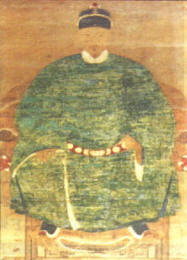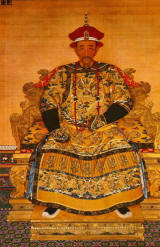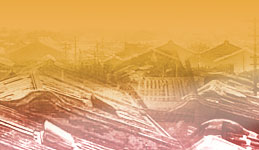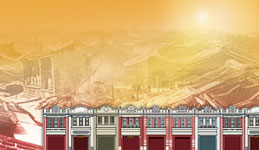          

|
|

|
 Dawn
Dawn
Lukang
area, in which "No sky" street area was located, was
Pingpu tribe’s
land before occupied by Hollanders. Pingpu tribe was active in the western
part of Taiwan and Yilang Plain. There were 40,000 to 50,000 of them divided
as 8 clans. Lukang, located in central Taiwan, belonged to Babusa’s active
area. This clan mainly lived on hunting, some simple farming, and fishing.
Due to the lack of historical records, there is no way to know if the
society had immigrants. However, during the late years of Ming dynasty, the
ban on maritime trade was lifted and it was very likely that residences
along coast of southern Ming went to Lukang to do business.
|
|
 |
 |
|
Pinpu
tribe's hunting festival |
Pinpu
tribe's farming activities |
|
|
|
|
 TOP
TOP |
 Foreign regime
Foreign regime
The
end of 15th Century was the epoch of navigation and European hegemony of sea
started to develop in the far east. In 1624, Hollanders entered the southern
part of Taiwan and developed toward the central and northern part gradually.
The immigration of Hollanders symbolized Taiwan’s change from a tribal
society into a general society and made immigration more possible.
Hollanders’ dominance of Taiwan required large amount of labor and thus
appealed to many Han immigrants. Meanwhile, due to the war in mainland China
(Ming and Cing’s fighting over political power), more and more Han people
immigrated and early Han immigrants appeared in Lukang.
In 1661, Jheng
Cheng-Gong defeated Hollanders and became the new ruler of
Taiwan and started a new page of Jhengs’ ruling in Taiwan. During Jhengs’
ruling, because of their hostile attitude toward the Cing government,
immigrants were less than the Holland-occupation period. According to
“Lukang’s Local Records”, there were about 2,000 Han people, most of whom
were from Singhua, Fujian, doing farming and fishing. Later, some people
from Cyuanjhou and Jhangjhou, Fujian gradually moved to Today’s Lunzihding
in Lukang. This pattern should be the main pattern of Lukang’s immigration
before Cing Dynasty.
|
|
 |
 |
|
Jheng's war against the Netherlands |
Jheng
Cheng-Gong |
|
|
 TOP
TOP |
 Turning Point
Turning Point
In 1683, Shih Lan defeated Taiwan and made Taiwan lack of political power.
Larger amount of lands became deserted and made Taiwan a paradise for the
poor who had no lands. Therefore, although Cing government had strict laws
banning emigrants, lots of Ming and Yue emigrants violated the bans and came
to Taiwan to cultivate. During the later years of Kangsi, many immigrants
came to Taiwan and made the business in Lukang started to prosper. In sum,
from the period before the occupation of Hollanders to Cing goverments’
official claim of Lukang as a commercial Harbor, people along the southeast
coast kept violating the ban on maritime trade and immigrated to Taiwan.
This made Lukang, though with limits, became an important commercial Harbor
in Taiwan based on its population growth and superior harbor condition.
|
|
 |
 |
|
Emperor Kangsi |
Map
of Lukang harbor in Emperor Kangsi's reign |
|
|
We may conclude that the
two hundred years, from Pinpu tribe's plantation to Shih
Lan's war against Taiwan, as a period called
dawn. Lots of trades
activities was about to start alone with the excellent
condition of Harbor. Even the government enacted policies in
forbidding mainland immigrants to come to Lukang, the
immigrants still came to Lukang. Lots of the
immigrants not only provided profound labor for the "No sky"
street area, but also a lot of merchants were attracted to
Lukang which led to the development of "No sky" street.
《Next
Peek…》 |
|
|



